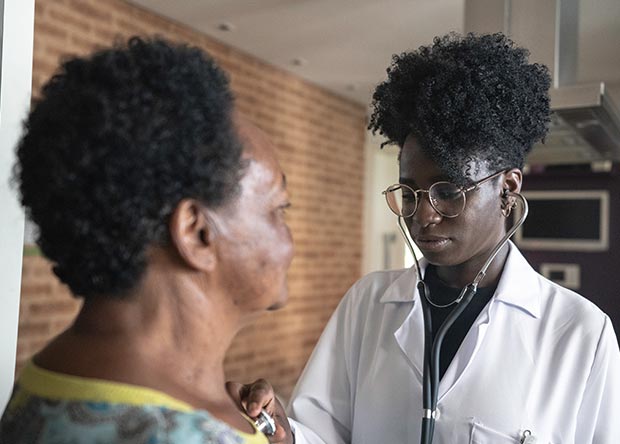Make your Multiple Myeloma Promise
You’ve taken the first step toward learning about multiple myeloma (MM), a rare blood cancer that impacts Black people more than other groups—now what?
By making this promise to ourselves, we are also promising to share what we know about MM and to spread awareness to those we love so we:
- Understand our MM risk
- Know what MM signs and symptoms to look out for
- Make better health decisions and see our doctor more often to help preserve our overall health and monitor our chance of MM
- Have a voice and speak up about MM with our doctor if it’s not on their radar
- Don’t wait to take action, regardless of where we are on the MM journey
- Dig deeper into the information on MM and its treatments so we can ask better questions
- Get an idea of the stages of MM across the journey, and know what resources are available to us
- Pace ourselves and get ready for long-term treatment
- Strengthen the relationships we have with the care team so that we can manage treatment better
- Prepare the care partner for how their role will grow and evolve as time goes on
In consideration of the time spent participating in this activity, Stephanie Hubbard was paid an honorarium by Janssen.
Make your Multiple Myeloma Promise
Self-advocacy
Leader. Husband. Wife. Father. Mother. Sister. Brother. We have many titles. Let’s add “Health Self-Advocate” to the list.
When we speak out about our health, we advocate for ourselves and those we love most. What we say and do can affect our treatment. And we’re more likely to be successful when we are well-informed and take an active role in our care. When we are up front with our care team about our treatment preferences, abilities, feelings, and resources, we can help develop a plan that fits our lifestyle and the lives of those who support us.
MM is not curable, so it’s important to think long term when self-advocating. Your care partner can also be a great advocate for you. They know you better than the care team and can help communicate your wishes and perspective so you get the support you’re looking for during MM treatment. This is especially important because your needs will change over time, and you’ll need to update people on what your expectations are at different stages of the disease.
Part of your self-advocating could include discussing multiple myeloma with your doctor. Learn more about how to discuss the risk factors, signs, and symptoms you have concerns about here.

Speaking up if you’re not getting the care you need
Having an active role in your health includes recognizing that you—like all of us—deserve to be seen and heard.
If you have concerns about your treatment and don’t feel that your doctor is addressing them, don’t be afraid to get a second opinion. Not all doctors have extensive experience with multiple myeloma. A second opinion can help you feel more confident in the treatment plan you choose.

Taking charge of your health by being engaged
There is no such thing as a small question when it comes to our health. Giving your doctor a complete picture of your symptoms is the best way to ensure that they can work with you to develop a treatment plan.
When you ask your doctor questions, you show that you take your health seriously. You are also communicating that you want to be part of the decision-making process. This helps make sure that your doctor gives you the best care possible on an individual basis.

Questions to ask your doctor and care team
Check out the MM self-advocacy empowerment guide.
Make your Multiple Myeloma Promise
Multiple myeloma treatment challenges
Certain diseases can be more difficult to diagnose and treat than others, especially when they’re uncommon. That’s why it’s important we are informed about multiple myeloma (MM), so we can help our healthcare team provide treatment guidance as quickly as possible.
If you are experiencing symptoms or you are diagnosed with MM, you’ll want to be aware of some of the challenges that may lie ahead in your journey:
Finding an MM expert
Finding an MM expert
Your primary care doctor knows a lot about general medicine and common diseases. However, they might not know a lot about MM because they don’t specialize in it. It doesn’t help that many of the signs and symptoms of MM resemble other diseases. If you suspect you have MM, here are some actions you can take to help guide your doctor. You can:
- Discuss your MM risk and any signs and symptoms you are experiencing, especially if you have more than one
- Ask your doctor if testing for MM makes sense for you
- Ask for a second opinion or a referral to an MM specialist (hematologist-oncologist), if they are not experienced with MM
Exploring your care options
Exploring your care options
Doctors who specialize in practicing certain types of medical care are not as common as doctors who can monitor our overall health. Depending on where you live, you may not have a hematologist-oncologist around the corner who can treat your MM. If this is the case, you may want to explore:
- Telehealth services: As we are becoming more digital, your doctor may be able to provide virtual checkups that don’t require you to come into the office for every visit
- Insurance and travel services: Depending on your insurance coverage, some plans offer support in covering long commutes to and from your doctors' appointments
- Checking with your employer: Discuss your health coverage and available time off with your human resources office. They may offer additional time or a more flexible work schedule to help with doctors' appointments
New doctor, New relationship
New doctor, new relationship
The more you visit your doctor for checkups, and the more comfortable you become with them, the better your relationship will develop. If you are dealing with MM, you may be referred to additional doctors who specialize in cancer or blood diseases. With this in mind, there are a few things you can remember to help your new relationship with your hematologist-oncologist begin on the right foot:
- Set expectations: It’s important you let the doctor know any concerns, needs, or care goals from the beginning—letting them know what kind of care you want, and what kind of care would be most helpful
- Ask questions: By asking questions about your disease, test results, or treatment, you show a doctor that you are engaged in your health care and want the best possible outcome. If you ask good questions and try, your doctor can take a more personalized treatment approach
- Express your feelings: Multiple myeloma can be a stressful and emotionally draining experience, and it’s important to find ways to cope. Your hematologist-oncologist may be able to provide a referral for where you can find emotional support or the help you need
Starting treatment
Starting treatment
If you feel you aren't receiving your treatment as quickly as you need, it’s important you speak up and ask:
- About all the treatment options, including the ones that might work best and which have the least amount of side effects
- Which medicines are most affordable with your health insurance
- To make a treatment plan right away
Maintaining or changing treatment
Maintaining or changing treatment
Keeping in contact with your care team during treatment and communicating all of the good and bad that you experience helps the team make any adjustments in your treatment. Changes often mean something more is needed to manage MM or that your condition may be worsening.
When you're faced with a change in treatment, remember:
- Medicines work differently for everyone. What works well to control one person’s MM may not work the same for yours
- Newer medicines are being made available to target MM differently. New medicines can be scary to start, so talk with your doctor to set clear expectations, and note treatment milestones
- When you first start them, some medicines may require more effort from you, like travel, time off work, or monitoring. Doing your own research and discussing feasibility with your doctor can help you find solutions if there are hurdles to get over
Together, you and your doctor can discuss the positives and negatives to starting treatment and decide what is best for you, your lifestyle, and your treatment goals.
In consideration of the time spent participating in this activity, Ellen Dillard was paid an honorarium by Johnson & Johnson.







